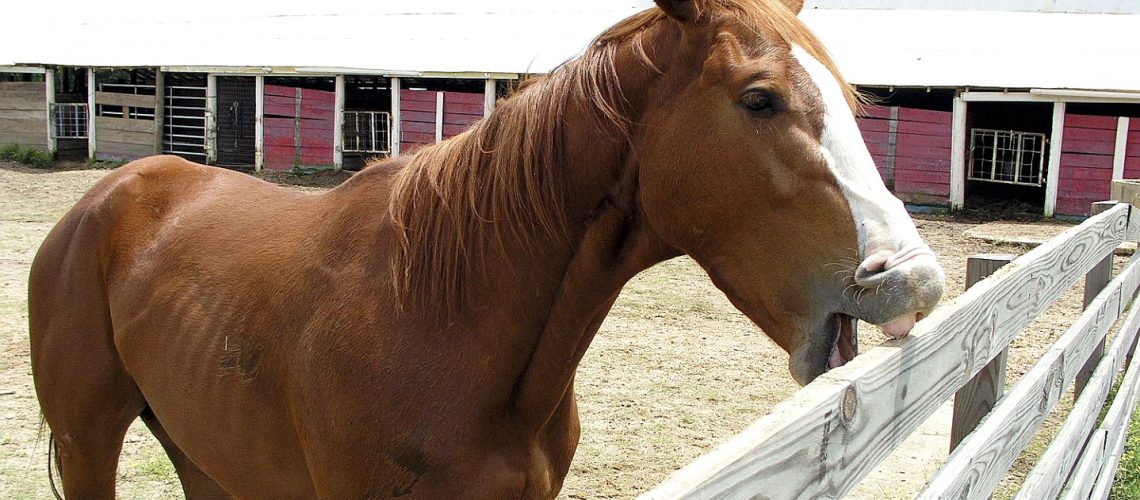
Stock & Noble
How Can I Help Prevent My Horse From Cribbing?
On average, roughly 1 in every 20 horses is prone to cribbing, and it’s a phenomenon that horse owners have been talking about for centuries. It’s very common to ask about cribbing when buying a horse—it’s probably one of the key things that can make or break a sale! Most horse owners want to avoid owning horses that crib, as their behaviour can damage equine fencing and lead to health issues.
So, why do horses crib, and how can we help prevent it?
What is cribbing?
Cribbing is a compulsive habit that some horses form, where they grab an object with their teeth (usually your fencing!) and suck in air. This causes a characteristic burping noise that sets cribbing apart from lignophagia, where a horse just compulsively chews on wooden objects, without gulping in air.
It’s generally accepted that horses do this to give themselves a sort of ‘head rush’ from the sudden influx of oxygen. Cribbing doesn’t always result in damage to your fencing or stables, but it can. It’s thought that horses that crib use it to reduce stress, and there are several factors that can feed into this. Some of them include:
- Stress
- Boredom
- Excess energy
Horses owners often believe that a cribber can teach other horses to crib, but there is little evidence in support of this. Instead, it’s more likely that horses in the same stressful environment develop cribbing habits individually, all in response to the same stressors.
Is cribbing bad for the horse?
There is some evidence that cribbing can cause stomach ulcers, but the main health concern regards the horse’s teeth. Too much cribbing can result in worn down top incisors, which can make eating difficult for the horse.
Since cribbing is behavioural, it’s also worth considering the mental health of the horse. Those who depend on cribbing too much can begin to crib instead of eating, and this can lead to health problems, too. Ultimately, the root cause of the behaviour is anxiety, isolation, or boredom, which needs to be addressed.
How can I help prevent cribbing?
While there are no sure-fire ways to prevent cribbing, there are some measures you can try.
The first way you can manage cribbing is by treating the cause. If your horse is bored or full of energy, the solution could be to turn them out to pasture as much as possible. Remember, horses are social animals, so they need to spend time with other horses in order to stay healthy. If you don’t have any other horses, some people find that social interaction with other livestock can help. Keeping your horses out to pasture is also a good way for them to get all the exercise they need.
That said, some horses who are perfectly happy and completely stress-free are still prone to cribbing. In these cases, another method to help reduce the behaviour is altering the horse’s diet. Many horse owners find that reducing grain and providing other types of roughage can help.
Some horse owners also resort to cribbing collars, but these can be very tight, and cause abrasions over time. A better method for managing cribbing is to control the behaviour rather than try to stop it entirely. Because it’s so hard to stop cribbing completely, many horse owners find that encouraging it in specific places and discouraging it in others is the most effective option.
This might include making a spot specifically for cribbing, and covering it with rubber to help protect your horse’s teeth. Other surfaces, such as your fencing, can be painted with anti-cribbing solutions, to deter your horses from chewing them, and encourage them to use the rubber areas you create for them.
Stock and Noble have the solution for you
All our premium equine fence paints contain Never Crib, our unique anti-cribbing solution, which you can use to help manage your horse’s habits while keeping them both happy and safe. What’s more, our range helps keep your fence looking great, and protects against sun, rain, and mould too!
The best thing you can do for your horses is to invest in their environment. Talk to us today, and let us help you look after them.